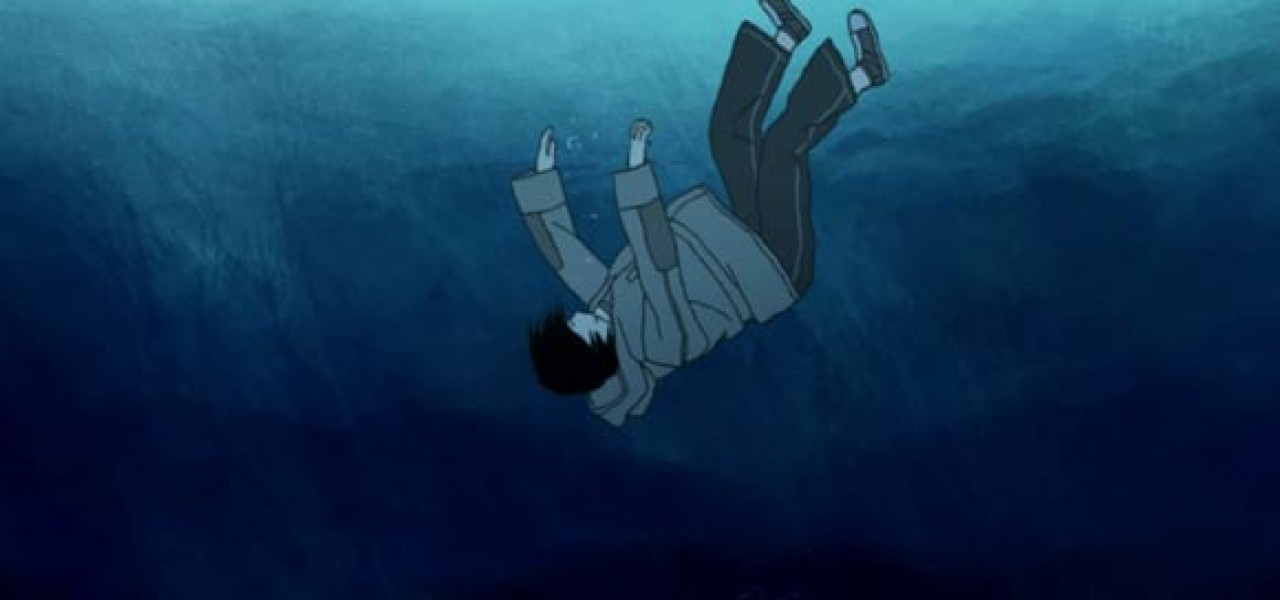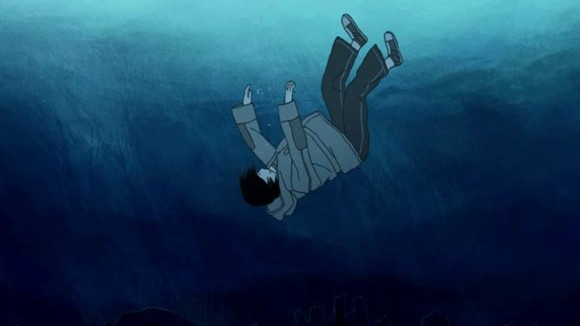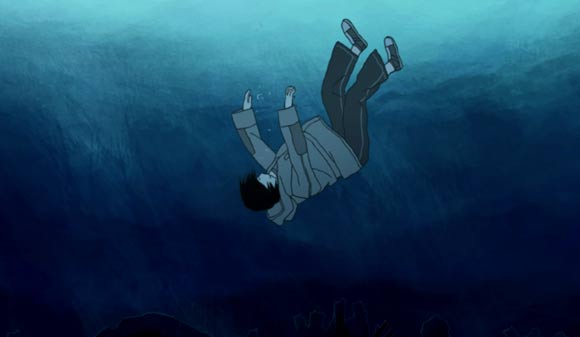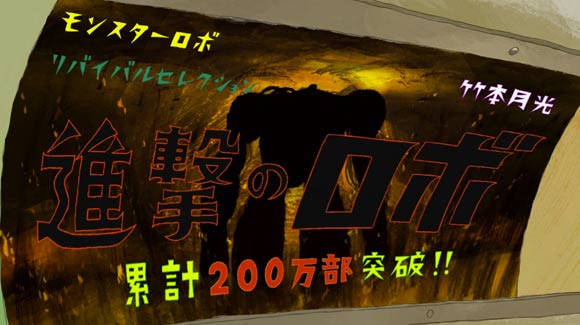

‘Ping Pong’ Recap: ‘You Love This Sport More Than Anyone’ (Ep. 6)

Half a year on from the events of the previous episode, it’s a winter of the soul for the various protagonists. We see just how much has changed in the intervening months through the kaleidoscopic lens of one Christmas Eve.
Time shifts can be abrupt and extreme in Ping Pong, none more so than that between this and the previous episode. This time we jump straight from summer to winter. This is just another example of Masaaki Yuasa’s compressed and dense storytelling style. Rather than being linear and systematic, it’s almost literary in how it jumps around time and space, and how much it evokes in just a few passing shots. The climactic scene of Peco drowning in the ocean was the highlight in this regard: As consciousness fades, memories of past and present swirl, and Peco symbolically embraces a dolphin as he longs to be taken far, far away from everything.
The previous episode focused on Sakuma’s victory over Peco and subsequent defeat by Smile. This episode builds on this and focuses on the deflated Peco, who is now squandering his innate talent for the sport. For all his bluster, deep down he was coddled and easily discouraged by the realization that he wasn’t the best player out there. If Sakuma made effort but had no talent, Peco has the talent but lacks the motivation to make effort. Defeat freed Sakuma from the competitive mindset that blinded him to this obvious truth.
During their exchange on the bridge, Sakuma verges on telling Peco that he was everyone’s … something … but he doesn’t finish his sentence. The word he was about to say is obviously: Hero. This confirms my running suspicion that the hero who always seems to come save Smile in the recurring imaginary scenes is none other than his friend Peco.

This is echoed by a comic book entitled Attack on Robo being read by some children in the subway, which seems to be a parody of the currently popular Attack on Titan. Peco’s enthusiasm and confidence inspired his classmates with the positive attitude they needed to strive to achieve something. Sakuma pays his friend the ultimate respect of trying to shake him out of his stupor, including pulling the cigarettes out of his mouth and throwing them into the water. What the cold-hearted Smile most needs now, it seems, is for his friend Peco to regain his self-confidence.
This was one of the more densely packed episodes so far. Directing and style were pretty much exactly on par with previous episodes. Despite being fragmented in its story, which is somewhat Magnolia-esque with its intertwining stories, the episode felt more tight and satisfying than previous episodes.

The episode reminded more than ever of Mind Game with its numerous intertwining stories. The layouts of the shots were also typical of Yuasa: wide angle with slight bowing becoming pronounced as the characters get close to the “camera”.
The Christmas Eve celebrations showed the various characters in contrasting situations. Peco got drunk on chocolate liqueurs. Kong sang “All Alone on Christmas” even though he was surrounded by friends and his mother. Smile, in actual fact alone, sat in his room in the dark and blew out the candles on the cake given him by his coach. The enigmatic Egami made another wordless appearance, this time arriving at the mountain only to long to go overseas. Sakuma, now a construction worker, shoveled concrete, near where Yurie fruitlessly awaits Ryuichi for a date, while playing out a fantasy in her head.
Ryuichi, meanwhile, lies in bed back home, and judging by the pile of crumpled kleenex by his side, appears to have been using the poster of Yurie on the ceiling above his bed as a “visual aid.” Is it a case of forbidden love? The show has been ambiguous about the nature of their relationship. She walks in on him naked in the bath as if it were nothing, yet the two don’t seem to have done anything. It seems the feelings are there, but Ryuichi suppresses them – seemingly less because of the cousin stigma than because their relationship would get in the way of his ambitions. Rather than explaining each of these threads in detail, the show does a good job of getting your brain spinning in a frenzy trying to piece together the visual clues. Things are briefly hinted at through carefully staged moments that hint at the larger emotional picture.
The drawings were spot on most of the time and didn’t seem to be struggling as much as the last few episodes. There were no particularly impressive pieces of animation, but there were some nice moments here and there. Yasunori Miyazawa was again present, but he didn’t have a really obvious scene like last time. He is actually a versatile animator and can often be found animating everyday acting scenes, which is presumably what he did here.
The standout name this time is Naoyuki Asano, who was one of the episode’s animation directors. I’m not positive what he did, but he’s a very talented animator in his own right and it’s great seeing him here. He no doubt helped a lot in maintaining this episode’s quality. It’s too bad the schedule didn’t allow for an entire episode handled by him so that his touch could be more visible. He’s primarily known as an animation director on Doraemon, but he’s done lots of side-projects that show off his versatility, including a crazy music video for Gen Hoshino that showcases his off-kilter imagination and visual exuberance. It seems to take place within a dream of Nobita, the protagonist of Doraemon. (Skip to the 4-minute mark when the live-action kicks in.)
His best piece so far, though, is a 2012 short film entitled Minding My Own Business on the subject of bullying in Japanese schools. Made with simple, pared-down visuals and sprightly hand-drawn animation, it’s a lighthearted but delicately moving short film that’s another great showcase of his talent.
Ping Pong Episode 6: You love this sport more than anyone
| Storyboard: Script: Series Structure: |
Masaaki Yuasa | |
| Episode Director: | Takehiro Kubota | |
| Chief Animation Director: | Nobutake Ito | |
| Animation Director: | Naoyuki Asano | Sayaka Toda |
| Nobutake Ito | ||
| Key Animation: | Satoshi? Nakazawa | Toru Hamasaki |
| Sakiyu Saito | Kaori Takadono? | |
| Hideyuki Sugiura | Betsujin Shishido | |
| Takashi Nakamichi | Ryosuke Nishii | |
| Tetsuro Kaku | Maki Kawake | |
| Sadao Oshima | Kanako Maru | |
| Tomomi Kawazuma | Fumiyuki Uehara | |
| Makoto Ogasawara | Kei Shimada | |
| Washio | Saori Koike | |
| Kanchi Suzuki | Yasunori Miyazawa |

.png)